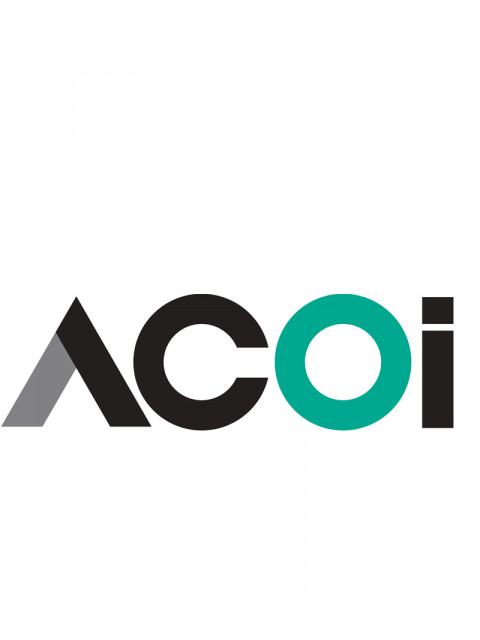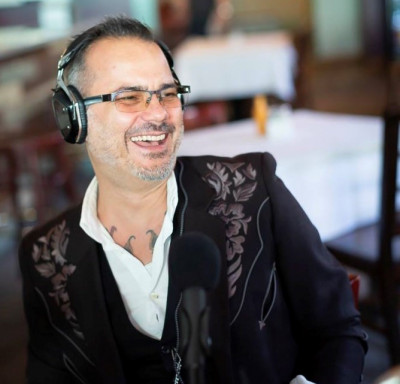
Voices Across ACOI: MarkAlain Déry, DO, MPH, FACOI
by ACOI
September 2, 2025
Integrity and Passion Put into Practice
An infectious disease physician provides vital, creative public health outreach
 What does a shocking first fishing trip have in common with treating infectious diseases? For MarkAlain Déry, DO, MPH, FACOI, it’s as simple as compassion. An osteopathic physician board-certified in infectious disease and internal medicine, as well as an ACOI board member and member of the PRIDE Committee, Dr. Déry’s career keeps him close to the natural tendencies that first drew him to medicine. The aforementioned trip was not the sole catalyst, but it played a significant role.
What does a shocking first fishing trip have in common with treating infectious diseases? For MarkAlain Déry, DO, MPH, FACOI, it’s as simple as compassion. An osteopathic physician board-certified in infectious disease and internal medicine, as well as an ACOI board member and member of the PRIDE Committee, Dr. Déry’s career keeps him close to the natural tendencies that first drew him to medicine. The aforementioned trip was not the sole catalyst, but it played a significant role.
The fateful event happened at age seven with his father. Everything was going well—until his father caught a fish. “My dad drops the line, reels in a fish, plops it on the deck, takes out a wrench, and clocks it over the head,” he said. “The fish dies instantly. At that point, several things happened. I screamed and freaked out. My dad thought, ‘Oh my God, what have I done?’ But what he did was, he created a doctor—and he created a lifelong vegetarian.”
That compassionate instinct has been persistent throughout Dr. Déry’s life and career. The Chief Innovation Officer and physician at Access Health Louisiana, internal medicine hospitalist at LCMC Health, specializes in diagnosing, managing, and preventing complex infections including HIV/AIDS and Hepatitis C. He’s also a wholehearted social justice advocate who promotes equitable care and public health awareness, including through a human rights-focused radio station and highly followed podcast. Now, at this year’s Annual Convention, he’s sharing a message about working from a place of integrity and compassion during a moment of upheaval in the healthcare field.
Dr. Déry is familiar with major turbulence in the realm of public health and infectious diseases. An early experience with people living with HIV shaped the direction of his medical career. It was also one in which his father, Gabriel Déry, OD, played an integral role: a prominent optometrist in Los Angeles, who had numerous clients who had been exposed to HIV, several years before treatment options existed.
“Before they even knew it was a virus or there was a test,” Dr. Déry said, “there were these specific ocular changes on the retina, called Cytomegalovirus retinitis. My father was able to determine who had HIV, and he would have to tell these men. He had lines out the door, and he would bring me to work with him on Saturdays, and during the summer—he knew at that point that I had this interest in healthcare. I may not have verbalized it [yet], but he could see that I had this passion for it.”
That experience drove Dr. Déry to put his passion into practice. He started by taking epidemiology classes in college, and became very fascinated by how viruses, particularly HIV, affect populations. “I really wanted to become a virus hunter. So, I moved to New Orleans after I did my requirements for medical school. My goal was to live here for a couple of years, train to become an infectious disease doctor, and then go work for the WHO.”
In New Orleans, Dr. Déry found his place—getting into its music scene (he plays bass in two bands), and meeting his wife, Lianna Elliott, who leads innovation and equity initiatives at the Bloomberg Center for Public Innovation at Johns Hopkins University.
Together, they co-founded 102.3 WHIV FM, a community radio station dedicated to human rights and social justice that also broadcasts programming on public health. They have also, by using “HIV” in the station’s name and being required to repeat that name multiple times each hour, inadvertently helped destigmatize HIV in the New Orleans area. “That is something that I'm very proud of—I don't think about it often, but I think we've left a really nice legacy here,” he said. That legacy includes having connected people nationwide with information on COVID-19 during the pandemic, something reflective of Dr. Déry’s goal of making public health knowledge widely accessible. Between WHIV and Noisefilter—the podcast and animated video series he produces and co-hosts with Dr. Eric Griggs, MD—his efforts toward that goal are extensive. And because that information is presented in personal, compelling ways, those efforts work.
Preparing a Community for Impending Care Challenges
These experiences make Dr. Déry fitting to present “Emerging Infectious Diseases in the Era of Limited Government Funding” at ACOI 2025. The topic is not necessarily at the forefront of many people's minds right now, which is exactly why he was compelled to address it.
Due to funding cuts to federal agencies like the U.S. Department of Health and Human Services (HHS), which includes the U.S. Centers for Disease Control & Prevention (CDC) and the National Institutes of Health (NIH), in his presentation, he wants to convey the significant work these agencies do compiling research on infectious diseases, and the dangers of not having that information available. “We’re busy clinicians, right? We can’t keep up with every piece of data—it’s impossible for us to be able to do that,” Dr. Déry said. “There's no way around it. I can’t read 100 papers and make recommendations to patients. I have to rely on people who do this for a living.”
His experiences treating numerous infectious diseases in the U.S. and abroad—including measles, Lassa virus, Hantavirus, and Ebola—inform this perspective. “When the first cases of bird flu surfaced around the world, [we found that] the number one group who is killed from bird flu is doctors and nurses,” he said. “The reason is, we’re on the front lines, and at the time, [patients] don’t know they have bird flu. Same thing for the Ebola virus: I worked for the WHO on Ebola in 2014 and 2015 in Sierra Leone, in Freetown. I was in charge of Connaught Hospital. That hospital had a huge wall of all the doctors and nurses who died from Ebola virus. It disproportionately affects healthcare workers.”
He explained how, without comprehensive epidemiology and infectious diseases resources and reporting, the chances of this scenario occurring in the U.S. could increase, leaving healthcare professionals vulnerable. By shining a light on this uncharted territory, he intends to give his fellow physicians the foresight and courage to face this challenge. “These are the realities of what these epidemics look like,” Dr. Déry said. “In public health and infectious disease, it’s easy to see what’s coming down the road. The problem is getting people to believe it.”
It’s increasingly clear why it’s important to overcome that obstacle and raise awareness. As an example, he said, “If you think to yourself, you haven’t heard much about measles, I’d say, neither have I. That either means those problems aren’t an issue, or it means surveillance no longer exists,” touching upon recent changes to reporting from the CDC, even as measles cases hit their highest level since being declared eliminated in the U.S.
The Power of the Osteopathic Perspective
To Dr. Déry, this topic has added relevance for osteopathic physicians. He sees an opportunity for osteopathic medicine to become a force for change, integrity, and better care in every scenario, including this one.
The reason he became an osteopathic physician is inextricable from this point of view. “I didn't want to be part of the system that sucked the soul away from health care,” he explained. “I grew up a punk rocker in the 80s. I was just a rebel with a cause, and my cause was purely humanitarian. And when I found out that there was another school of medicine, one that was more holistic—to the brain of a 22-year-old [going into medicine], that was really cool. It was appealing.”
Beyond that, he added, “I thought A. T. Still was a radical. I wanted to be in a profession in which I could also fight for injustice as we see it.” In his opinion, DOs today can stay true to their roots as practitioners by following Still’s example—distinguishing themselves as physicians committed to patient-centered medicine, who use their skills to care for marginalized and vulnerable groups.
This vision of justice-informed, compassionate, integrity-driven medical care keeps Dr. Déry going. And it includes showing up for his fellow osteopathic physicians, to give them the support they need to face the challenges ahead.
“I just want to make people aware of what’s happening,” he said. “And to speak to this in a way that helps get people ready for it, so they can be prepared—and when it comes, that they can be the best physicians they can be, and their community needs for them to be.”
Connect and Learn at ACOI 2025
The 2025 Annual Convention is an incredible opportunity to hear about this and other compelling, relevant topics, all while connecting with the ACOI community. You can review the agenda to learn more—and if you haven’t yet, there is still time to register. Register today and join us for what promises to be a fantastic time in Marco Island!

